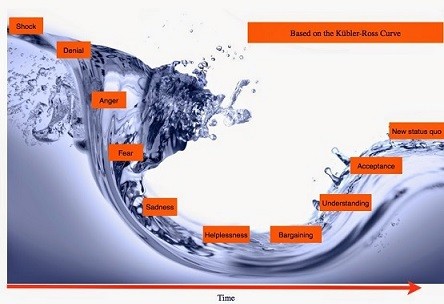
The ‘Kübler-Ross’ Change Curve, can it help us understand our feelings around Covid-19?
Many of you may have seen or heard of the Kübler-Ross model; it is used often in organisational training and change programmes. I first heard of this model in the early 90s when I was project managing large-scale corporate restructures; we would use the model to help clients explore and understand where they were emotionally within the change process. Over the years, I have used it with clients to help them move through a range of emotional challenges, from dealing with uncertainty at work to, anxiety and personal loss.
Elisabeth Kübler-Ross was a Swiss-American psychiatrist and an international best-selling author. In 1969 she presented her theory on the five stages of grief, known as the ‘Kübler-Ross model’. The five stages are denial, anger, bargaining, depression and acceptance. The image above is based on her model and further expanded.
I have been trying to make sense of what has been happening on an emotional level to myself and my clients during lockdown. Personally, it feels similar to sudden loss. Three years ago, I had to deal with the sudden loss of a family member. At the time, I noticed how pragmatic I became in the initial stages with the knowledge I would need to process my feelings further along. I was solution-focused; I started thinking like a project manager, and it felt similar just ahead of lockdown. As we headed into lockdown, I upgraded my software, adding MS Teams, WebEx alongside Zoom. I ordered a 32-inch monitor to make working from home more comfortable, I sent off for a new iPad, as a backup for client video calls. I ordered printers and extra toner and my work moved forward almost seamlessly. Now, what about my feelings? Where am I on the change curve?
The above-expanded model covers ten areas of change for consideration; shock, denial, anger, fear, sadness, helplessness, bargaining, understanding, acceptance and new status quo. I can find myself moving along the curve and back again. I move from sadness to understanding, and if I think for too long, I can see myself slipping back to sadness as I miss some of the things I took for granted before lockdown. However, it is helpful for me to remember that change is a process and not an event. For me, at this stage acceptance is moving closer; the new status quo is still some way off. That said, I do find it helpful to glance at this model at times. I see this in the same way as I would an emotional road map, and I like to understand where I am on the journey. I wanted to share this model with my LinkedIn network in the hope some of you might find it helpful.
Principal -executive coach-Learning and Development at Brooklowe Coaching
3yMost interesting and relevant in our strange current environment thanks Ian
Safer Homes and Neighbourhoods Director at The Hyde Group
3yWhat an inspiring read. Completely agree about the feeling of loss. Are you happy for me to share?
Vice President, Talent Development & HRMS at Crane Co.
3yThanks Ian Claffey. I have used the Kubler-Ross model in change management resources and training for years. It is an easy model for people to understand and the different emotions noted are very relevant. I think one of the key principles- and you have noted this in your commentary- is that as you make your way through the change curve, it is a dynamic model; you can go backward as often as you make progress forward- and this is a natural part of moving through the change.
B2B Thought Leadership | Content Strategies, Audits, Blueprints | Merriborn Content Engine 4 Growth | Employer Research+Insight | Awards Entries | Bespoke Podcasts | Journalist, Editor, Author, Broadcaster, Speaker
3yThanks Ian - this is really interesting and helpful. I asked a friend who runs a stall in our local market of his experiences in selling to many different customers as we return to "normal". He thinks many people have changed - in his words, he feels they have been "inwardly scarred" by the experience of lockdown. I do wonder whether there is a residual sadness within some people ... anyway, lovely article and I think I will share it.
Non-Executive Director | Leadership Coach | Business Mentor & Independent Advisor
3yThanks for sharing - really useful and insightful stuff. Challenging to think that millions and millions of people are experiencing / going through this at the same time Ian.